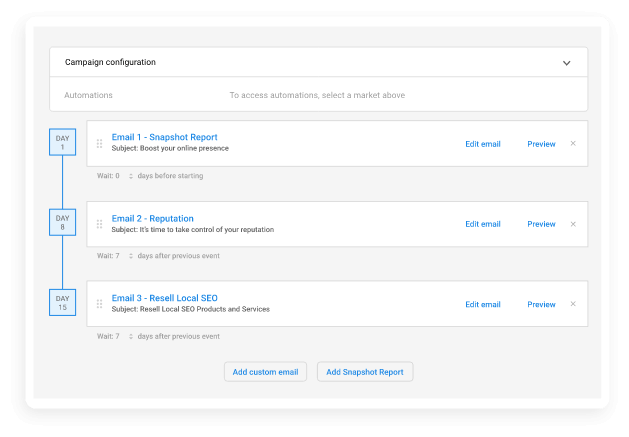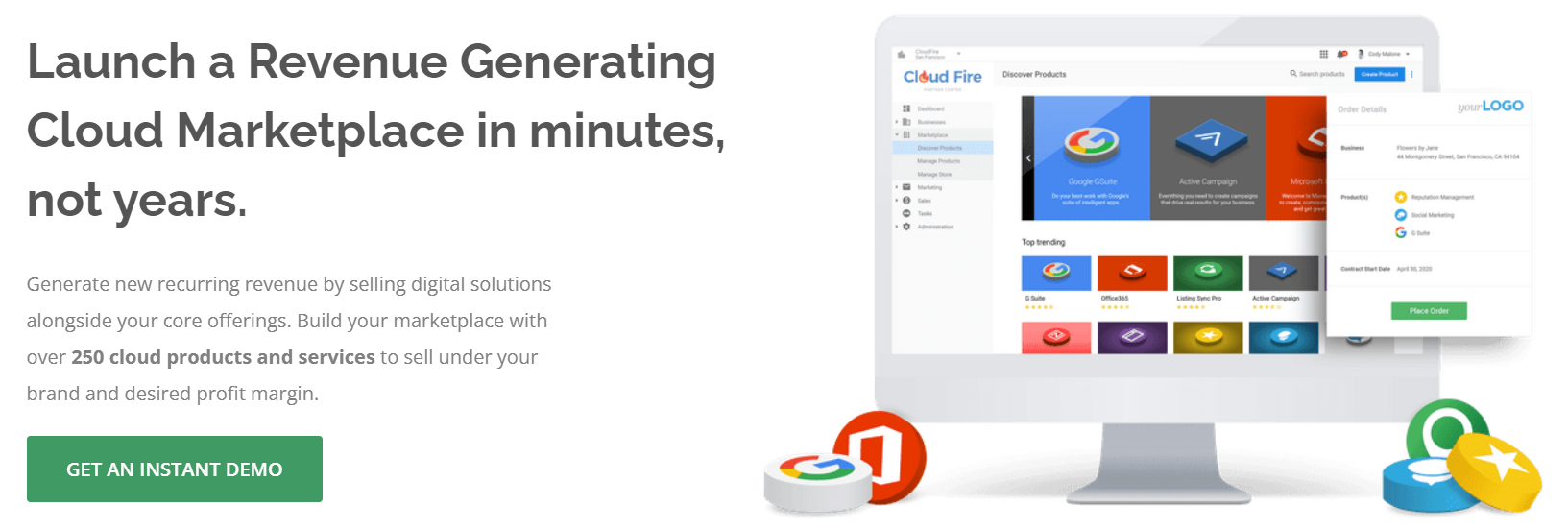Beginner’s Guide to the Digital Marketing Ecosystem
Digital agencies have ecosystems for their own marketing efforts. They also manage separate ecosystems for their clients, though those separate systems may live within the larger whole supported by the agency.
Learn how automations make you efficient, enhance your productivity, and help you win with local business. Download “Agency Marketing through Automation” today.
For digital agency startups or established firms, a diverse and well-supported digital marketing ecosystem enhances technical adoption, drives efficiencies, supports scaling, and helps deliver optimized services for clients.
What is a digital marketing ecosystem?
A digital marketing ecosystem is the overall landscape of digital marketing efforts and resources for a brand. It can encompass a business's website, social media channels, email lists, video presence, PPC ad campaigns, and the technology tools teams use to manage all these functions.
The importance of a digital marketing ecosystem
A well-established ecosystem supports your digital marketing strategies, helping your agency and your clients achieve business goals. Strong digital marketing ecosystems can:
- Increase efficiencies. When you think about your services and marketing tasks in an ecosystem mindset, you foster big-picture thinking. That can help you make decisions about platforms, automations, and other tools that drive productivity and remove potential waste such as rework and errors.
- Support optimal customer targeting. A well-structured marketing ecosystem requires you to understand your ideal customer so you can choose the right platforms, communication methods, and messages to target them.
- Reduce costs. Integrating automation tools, developing strategic goals, and implementing the right platforms for your niche helps you cut down on unnecessary spending and improve cost-based metrics such as the cost of acquisitions and leads or return on ad spend.
- Support scale. A digital marketing ecosystem built with your business goals in mind can help you scale and increase revenue—or drive such positive outcomes for clients.
Essential components of a digital marketing ecosystem
When starting a digital marketing company or launching a client's marketing campaigns, be cognizant of the common components of successful digital marketing ecosystems. They include:
- Websites
- Social media platforms and profiles
- Email marketing lists and platforms
- Content creation, including text, image, and video content
- Analytics tools
For the ecosystem to work well, all tools within it must operate with some level of interconnectivity. Appropriate synergy in your ecosystem reduces manual work—thus reducing error risks—and increases opportunities for cost-saving automations.
10 steps to building a flawless marketing ecosystem
Follow the best practices below to build a digital marketing ecosystem for your agency or support one for your client.
1. Define your goals and objectives
The right marketing objectives act as a guidepost, ensuring your ecosystem and the marketing actions occurring within it align with agency brand identity and your concept of success. Remember that your goals and your clients goals are not the same, so it’s important to start with this step with each new client—or take time to understand the goals they’ve already identified.
Use a goal-making model, such as SMART goals, to ensure your objectives are specific, measurable, achievable, relevant, and time-bound.
2. Identify your ideal client base
Before you can figure out how to find clients, you need to know who your target audience is. Or, as a marketing consultancy business, you need to identify the target audience for your clients.
This critical step informs other work in building a digital marketing ecosystem, as your ideal client base can make a difference in what types of platforms and tools are most relevant. For example, a business offering services to retirees isn’t likely to have huge marketing success with quippy video content on TikTok.
3. Conduct thorough market research
As you can see, the first few steps in building a winning digital marketing ecosystem are all about information. Once you understand your objectives and know your target audience, it’s time to learn about the market. This is an especially critical step when providing marketing agency services to others, as you might not be familiar with every client’s home niche.
Ask questions—of your team and your clients—such as:
- What are the common pain points of consumers in this market?
- Who is leading the market when it comes to goods and services as well as messaging?
- What value proposition do you or your client bring to the market?
- Are there any inherent rules or expectations in this niche that could impact marketing?
4. Choose the right digital marketing channels
Across the globe, social media channels are the most popular digital marketing channels, with 44 percent of marketers using them. Marketers use a variety of channels, however, and it's important to find what works for you. A survey of business-to-business and business-to-consumer marketers uncovered these leading channels (Statista):
- Social media, used by 44 percent of respondents
- Website and blog marketing, used by 36 percent
- Email marketing, used by 35 percent
- General content marketing, used by 32 percent
- Influencer marketing, used by 30 percent
- SEO marketing, used by 26 percent
- Virtual events, such as webinars, used by 25 percent
A boutique marketing agency might concentrate its ecosystem around specific channels—for example, an agency that focuses on TikTok success for clients may primarily be concerned with social media and influencer marketing. Or, you might offer comprehensive website marketing services that include content and SEO marketing. Think about the channels that best support the services you want to offer clients.
5. Implement a robust data analytics system
Regardless of the channels you work with, you need a system to capture and analyze data about marketing performance. Data analytics helps you:
- Understand what works so you can repeat it in the future
- Identify lagging efforts so you can work to improve them
- Demonstrate value to clients to support ongoing buy-in for your services
6. Develop a content strategy
Your marketing and lead generation strategies should include robust content strategies. Aim to communicate in a way that engages with target audiences. This requires:
- Choosing appropriate styles. Should you convey ideas via formal or journalistic writing, or would a conversational style be best? Is the brand voice serious, funny, or something in between?
- What type of content will you publish? Define common challenges or needs of the target audience and come up with content types and topics that speak to those needs.
- How will you create content? The content hamster wheel can be challenging to manage, especially for agencies with multiple clients. Consider what tools and resources you need to ideate, write, edit, and publish content, whether that's in-house team members, freelancers, AI, or some combination of all of those things.
7. Integrate marketing automation tools
The global market for the marketing automation industry grew 22 percent from 2021 to 2023, and experts predict it will double again from 2023 to 2030 (Statista). The ability to incorporate AI and automation into digital marketing ecosystems is a must-have agency skill.
Consider tools from vendors like Vendasta that help you automate marketing and ad campaigns to reduce the workload on your agency without impacting your ability to scale services.
Image Source: Vendasta
8. Establish effective communication channels
Effective digital marketing takes a lot of back-end communication. You’ll need channels for internal teams, options for keeping up with external freelancers and vendors, and defined practices for client-facing communications. Your digital marketing ecosystem should include the tools you use for communication, such as Slack, Microsoft Teams, or project management software, as well as written policies for getting the most from those tools.
9. Continuously monitor and optimize your ecosystem
Once you’ve established your marketing agency strategy and ecosystem, the work isn’t done. Keep an eye on data analytics and continue to optimize various aspects of the system to support ongoing growth and improvements.
You may also need to rethink your ecosystem as you move into new niches for marketing agencies. What works with one niche or set of clients may not work with others, and digital agencies must remain agile in their approach.
10. Foster collaboration and knowledge sharing within your team
Agency ownership may have been your initial goal in launching a digital marketing company. Once you get going, however, continue to put effort into collaboration with your team. The more your team grows, the more your agency can grow. Consider investing in:
- Digital marketing training, such as SEO webinars
- Time for your team to read content marketing and SEO news each week
- Attendance at marketing conferences so you can network with and learn from others
How to avoid a bloated tech stack
One danger in investing in a digital marketing ecosystem is that you can create an overly complex tech stack. With so many digital marketing tools on the market, it’s easy to get distracted by shiny apps and new features. However, consolidating tools into comprehensive platforms and prioritizing integration capabilities so you don’t end up with siloed legacy systems down the road can help you avoid this issue.
When you start a digital marketing agency, it’s a good idea to evaluate your need for tech tools in detail so you don’t splurge on unnecessary resources. Conduct this type of evaluation periodically as you grow your agency to keep your tech stack lean and functional.





